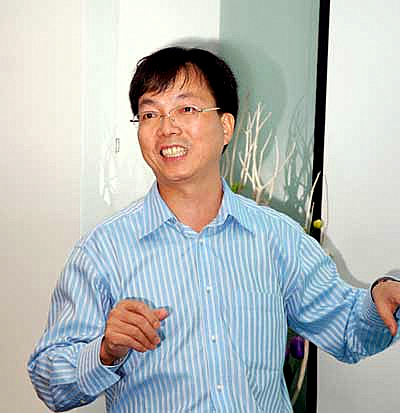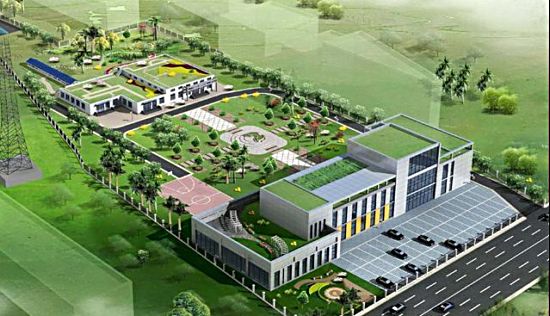 Dr Lin Yucheng, CEO & Chairman, United Envirotech.
Dr Lin Yucheng, CEO & Chairman, United Envirotech. Photo by Sim KihUNITED ENVIROTECH is one of the earlier S-chips to list on the Singapore Exchange. It was listed in 2004 and has sailed through the years with its reputation intact while some S-chips ran into corporate governance and accounting issues.
The company isn’t exactly an S-chip. Its founder, CEO and chairman is Dr Lin Yucheng, who has been a Singapore citizen since 1993.
I first met Dr Lin around the time of the company’s IPO.
I learnt then that he grew up in Fujian province, received a Bachelor of Science degree and won a government scholarship to pursue a PhD in the Imperial College of Science and Technology in London.
“I thought I would return to China to be a university professor,” he told me. But one day, he found himself at an interview arranged by Singapore’s Economic Development Board.
And that’s how, in 1990, he ended up in Singapore where, after a couple of years, he set up a joint venture that later metamorphosed into United Envirotech.
The company is a leader in advance membrane technology, especially Membrane Reactor (MBR) technology, in treating wastewater from China’s chemical and petrochemical industries.
|
|||||||||||||||||||||||||
This type of wastewater is harder to treat than normal wastewater discharged by households.
A key advantage of MBR technology: the treatment plant needs just 20-30% of the spatial needs of a conventional plant.
United Envirotech is a key player in the MBR technology space. It is recognized as one of only 7 international MBR companies in the world, along with big names like GE Water & Process Technologies, and Siemens.
United Envirotech has achieved outstanding projects such as its plant for Sinopec Luoyang, which was completed in 2004, and was the largest industrial wastewater treatment plant using MBR in Asia then.
****
At a briefing last Friday for analysts and fund managers, Dr Lin highlighted a couple of things about United Envirotech currently, including:
* Record order book: It now stands at S$160 m with engineering projects to be completed within 18 months, which is an average of S$53.3 m per half year.
That’s significant when compared with the company’s recent revenue. In FY 09 (ended March), the 12-month revenue was S$42.9 million. The revenue inflow was at about the same pace in 1H FY10 at S$20.1 m.
These revenue figures comprise contributions from both turnkey EPC engineering services and recurring treatment businesses.

Model of Guangzhou plant that will be China's largest MBR project - to be built by United Envirotech.
* China’s largest MBR project (picture above): United Envirotech, which has just announced this project, will build the plant in Guangzhou to treat municipal wastewater.
Highlighting the attractiveness of MBR technology, Dr Lin said the plant would be built on less than 10% of the area occupied by a conventional plant, which translates into lots of land savings for the local government.
The plant will be completed in 8-9 months, instead of the normal 18 months, as United Envirotech has committed to complete it before the start of the Asian Games in Guangzhou next November.
* The Nansha and Dafeng plants treat industrial water. They incur relatively high investment costs but United Envirotech charges higher rates for industrial water than for treating municipal water (in Liaoyang and Xintai). |
|||||||||||||||||||||||||||||||||||||||||||
Another 2 projects in Heilongjiang and Liaoyang which were secured in Sept and October will start contributing recurring income when completed in 2010 and 2011, respectively.
For an idea of the size of the recurring revenue, consider that in Q2 (ended Sept 09), it amounted to S$3.2 million (while engineering contributed S$8.1 million). If annualized, the recurring revenue comes up to S$12.8 m.
This figure will increase over time when:
a) the capacity of the treated wastewater rises;
b) United Envirotech increases its charges according to a formula agreed to with its clients, and completes the upgrading of plants.
c) United Envirotech secures or completes the construction of more projects, and operates the plants.
Glossary:
* TOT is Transfer-Operate-Transfer: Company buys the property and operational rights of a facility, and receives his returns through normal business operations within a concession period. At the end of such period, the company transfers the facility to its original owner for no cost.
* BOT is Build-Operate-Transfer: A company finances, designs, constructs, and operates a facility for a specified period of time, after which the ownership is transferred back to the owner. During the operating time, the company charges facility users fees.







